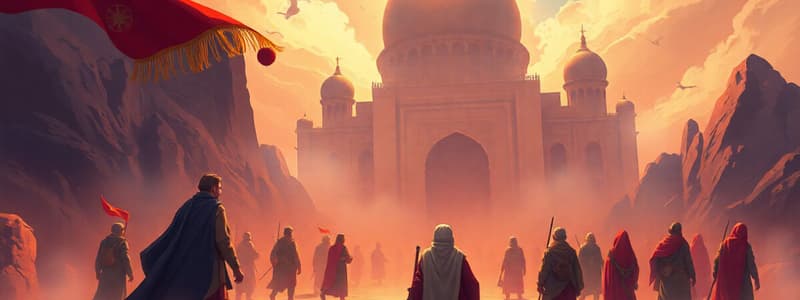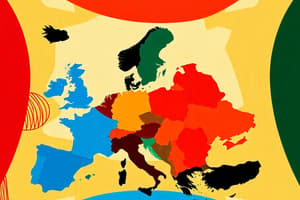Podcast
Questions and Answers
How did industrialization in France contribute to a more homogenous national identity?
How did industrialization in France contribute to a more homogenous national identity?
Industrialization created melting pots where diverse regions interacted, fostering a more shared French identity.
What role did literacy play in the formation of a national identity in France?
What role did literacy play in the formation of a national identity in France?
Increased literacy led to the creation of a national education system that promoted the French language and values.
What does the concept of the nation-state imply about the historical origins of nations?
What does the concept of the nation-state imply about the historical origins of nations?
The nation-state concept suggests that modern national identities are relatively recent creations rather than ancient and unchanging entities.
How did the spread of the nation-state idea influence other countries beyond France?
How did the spread of the nation-state idea influence other countries beyond France?
In what ways can national identity be considered fluid?
In what ways can national identity be considered fluid?
What are alternative identities that can exist alongside national identity?
What are alternative identities that can exist alongside national identity?
Why might the concept of an 'enemy' be significant in identity formation?
Why might the concept of an 'enemy' be significant in identity formation?
What is one key characteristic of national boundaries as discussed in the context of modern nations?
What is one key characteristic of national boundaries as discussed in the context of modern nations?
How did mass media contribute to national unity in France?
How did mass media contribute to national unity in France?
What historical example illustrates the complexity of nation-building?
What historical example illustrates the complexity of nation-building?
What is the primary difference between a nation-state and a simple territory?
What is the primary difference between a nation-state and a simple territory?
How do genetic maps of Europe challenge the concept of national identity?
How do genetic maps of Europe challenge the concept of national identity?
What was the linguistic situation in France during the early 1800s?
What was the linguistic situation in France during the early 1800s?
How did the concept of 'Frenchness' evolve over time?
How did the concept of 'Frenchness' evolve over time?
What is nation-building and why is it significant?
What is nation-building and why is it significant?
What role did the French Revolution play in shaping modern French identity?
What role did the French Revolution play in shaping modern French identity?
How did Napoleon Bonaparte contribute to the evolution of French national identity?
How did Napoleon Bonaparte contribute to the evolution of French national identity?
What impact did military recruitment have on French national consciousness during Napoleon’s era?
What impact did military recruitment have on French national consciousness during Napoleon’s era?
Why is the idea of shared ethnicity as a basis for national borders considered misleading?
Why is the idea of shared ethnicity as a basis for national borders considered misleading?
What does the evolution of national identity suggest about the perception of nations?
What does the evolution of national identity suggest about the perception of nations?
Study Notes
The Origin and Rise of the Nation-State
- The nation-state, a concept where a country is more than just territory, is a relatively recent idea, representing a community united by shared heritage and identity.
- Today, this concept is pervasive globally, often misunderstood as natural and ancient, despite being a constructed idea shaping our world.
- The nation-state model challenges the assumed naturalness of countries, revealing their artificial construction and the manufactured nature of national identities.
Challenging the Notion of Natural Borders and Shared Identities
- The French example disproves the idea of shared ethnicity and language as the basis for national boundaries.
- Genetic data shows stronger genetic ties between French citizens and individuals from neighboring countries than within France itself.
- Although languages within countries are often seen as unifying, this uniformity is relatively recent.
- France in the early 1800s had multiple languages spoken within its borders, contradicting pre-existing French national unity.
- Early French identity, during medieval rule, was primarily tied to local villages and regions.
Nation-Building: A Modern Construct
- Nation-building unifies diverse communities towards a singular national identity, not a natural process, but a historical and social transformation.
- The French Revolution, despite initial assumptions, did not fully establish the modern French identity but started the national unification process and introduced the concept of shared citizenship.
- Napoleon significantly advanced French national identity by promoting patriotism, creating powerful national symbols, and fostering shared belonging through military service.
- Napoleon's actions established a sense of French national consciousness but were abstract. Industrialization brought physical unification through transport and infrastructure.
The Impact of Industrialization on Nation-Building
- Industrialization promoted extensive rail networks, connecting previously isolated communities and enabling interaction.
- Factories and urban growth created interconnected urban centers, fostering a unified identity.
- Industrialization led to increased literacy and a national education system, promoting the French language and solidifying shared values and identity.
- Mass media (enabled by literacy) connected people, further strengthening national unity.
- Improved transportation and communication empowered the central government to exert control, spread national narratives, and implement uniform administrative systems.
Challenging the Myth of Eternal Nations
- Nations are relatively recent creations, as demonstrated by France's 19th-century nation-building, proving not eternally existing.
- Leaders often promote national myths to enhance loyalty, obscuring the true history of nation-building and its relatively recent origin.
Spread and Impact of the Nation-State Idea
- The French model propelled the nation-state concept across Europe and beyond.
- The unification of Italy in 1861 demonstrates the extended and complex nation-building process.
- The prioritization of national unity, and shared ethnic identity, fostered conflicts such as World War I, resulting from competing national aspirations.
- Nationalist ideology often marginalizes minorities, by constructing national identities around specific ethnic groups.
The Global Spread of Nation-States
- The concept of the nation-state spread globally, with nations established in various parts of the world.
- Global spread occurred, even within colonial contexts, leading to movements for independence and national assertion.
- Despite its recent origin, the nation-state became the dominant global political model, impacting our understanding of national identities and belonging.
National Identity
- National identity is an imperfect concept, with constantly evolving identities.
- National myths frequently lead to conflicts over territories and belonging.
- National identity is a powerful and enduring global force.
- National identities like the "French" alter and change over time.
Alternative Identities
- Larger identities exist independent of exclusion, competition or conflict, like a European identity.
- Living in global cities exposes people to diverse cultures, fostering cosmopolitan identities.
- Local communities, religion, and professions remain vital sources of identity.
The Role of "Them"
- The concept of "them" (an enemy) can be integral to certain identity formations.
- Identities formed through resistance or conflict may be stronger than inclusive ones.
- Conscious thought about the role of "them" in identity formation is essential.
The Future of Nations
- Nations remain a concept the world is still learning to manage peacefully.
- National boundaries can adapt and evolve.
- More inclusive and peaceful models for global population organization are conceivable.
Studying That Suits You
Use AI to generate personalized quizzes and flashcards to suit your learning preferences.




